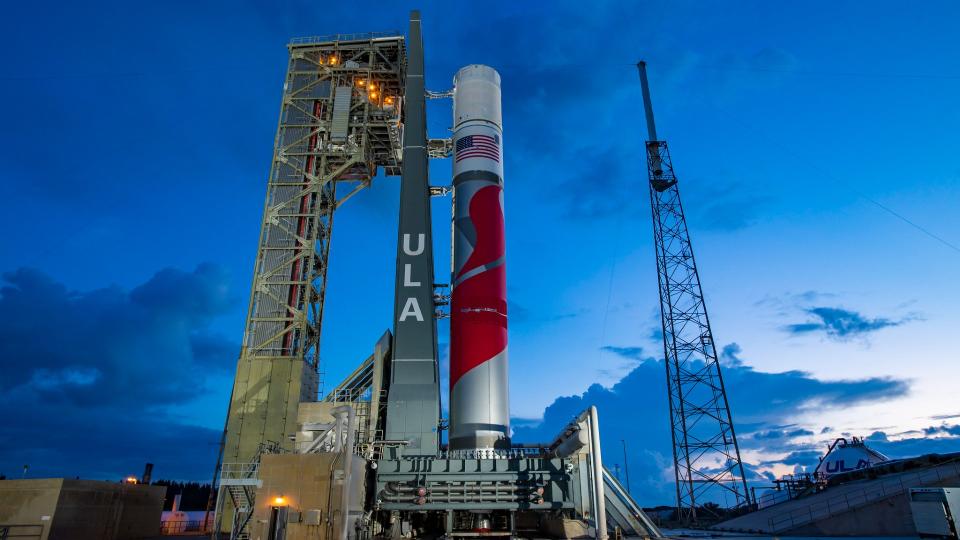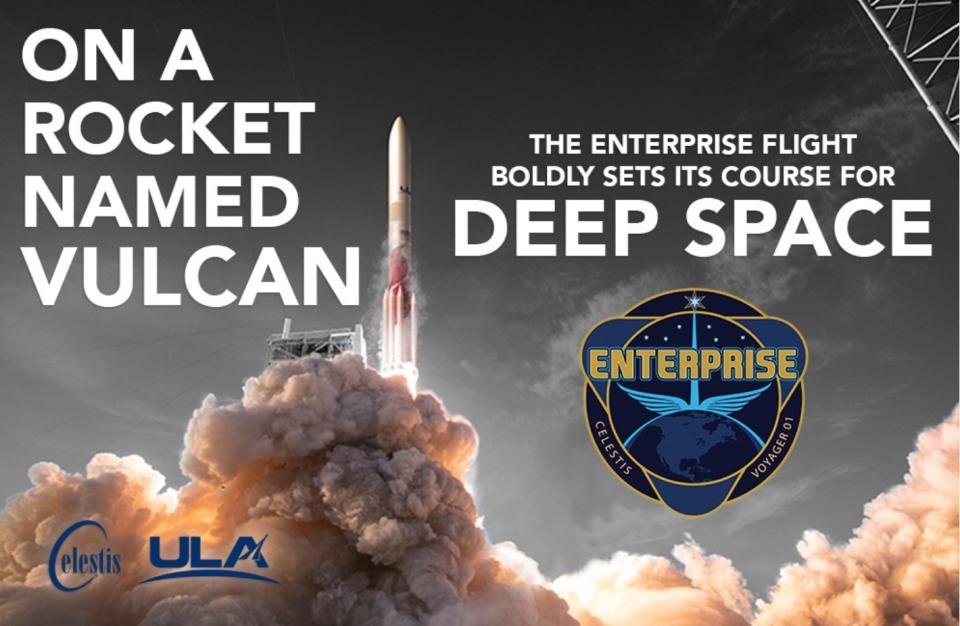For better or worse, the moon is officially open for business.
On Monday (Jan. 8), United Launch Alliance’s shiny new Vulcan Centaur rocket will launch from the Kennedy Space Center in Florida carrying Astrobotic’s Peregrine lunar lander and the Celestis and Elysium commemorative payloads of human remains and DNA.
Two memorial companies, Elysium Space and Celestis, may bring a symbolic portion of the remains to the moon’s surface as one of their services, with Celestis’ precious cargo of cremains and DNA riding along on its Tranquility mission, the company’s second lunar flight .
A second Celestis payload will also fly on the Centaur upper stage of the Vulcan rocket to travel beyond the Earth-moon system into deep space, establishing the most remote human presence among the stars. That Celestis Enterprise Flight will contain cremated remains and/or DNA material from numerous “Star Trek” icons such as Nichelle Nichols, DeForest Kelley, James Doohan, series creator Gene Roddenberry and his wife Majel Barrett Roddenberry, “2001: A Space Odyssey’s” VFX guru, Douglas Trumbull, as well as the DNA of current ULA CEO Tory Bruno, his wife Rebecca, several former Presidents of the United States and many others.
But not everyone is exactly happy about the upcoming flight. As reported by Arizona Public Radio on December 28, the president of the Navajo Nation, Buu Nygrenis unhappy with the idea of human remains being deposited on the moon and is formally requesting that NASA postpone this January launch due to the space agency’s promise to advise them before approving future memorial flights.
Related: DNA from four American presidents will be launched into deep space
In a December 21 letter to NASA and the United States Department of Transportation (USDOT), Nygren expressed his views on the matter. “It is critical to emphasize that the moon holds a sacred position in many indigenous cultures, including our own,” Nygren wrote. “We consider it part of our spiritual heritage, an object of reverence and respect. Depositing human remains and other materials on the moon, which might be considered discarded in another location, amounts to the desecration of this sacred shrine. room.”
Nygren added that the Navajo Nation believes that both NASA and the USDOT should have consulted with them before allowing a company to transport human remains to the moon.
However, despite the Navajo Nation’s strong objections, this is not technically a NASA mission. The mission will be the first launch of the Vulcan Centaur and the first mission under NASA’s Commercial Lunar Payload Services (CLPS) program, which aims to use private companies to deliver agency-led scientific payloads to the lunar surface to place.
The mission is actually a private commercial launch by ULA and Pittsburgh-based Astrobotic Technology, powered through CLPS, and NASA has no jurisdiction over exactly what additional payloads are included.

According to Nygren, this is an ongoing concern that “goes back to the late 1990s, when the National Aeronautics and Space Administration sent the Lunar Prospector with the remains of [geologist] Eugene Schoenmaker, to the moon. At the time, Albert Hale, President of the Navajo Nation, expressed our objections to this action. In response, NASA issued a formal apology and promised consultation with the tribes before allowing further missions carrying human remains to the moon.
In that particular case, the Office of Commercial Space, operating under the U.S. Department of Transportation, may have been negligent in failing to consult with the tribes before approving the launch’s official cargo certificate.


RELATED STORIES:
– Vulcan rocket to launch private Peregrine lunar lander during debut launch on January 8. How to watch live.
– For Astrobotic, a big-risk (and bigger-reward) ride on the Jan. 8 launch of the private Peregrine lunar lander
– ‘Star Trek’ commemorative flight adds two more names to its Enterprise mission
Nygren reminded the parties that NASA had previously committed to notifying the Navajo Nation of memorial flights and that the Biden administration committed to consulting on tribal concerns of this nature as outlined in the Memorandum on Tribal Consultation and Strengthening Nation- to-Nation Relationships of January 1, 2014. 26, 2021.
“This memorandum reinforced the commitment to Executive Order 13175 of November 6, 2000,” Nygren explained. “In addition, the Memorandum of Understanding Regarding Interagency Coordination and Cooperation for the Protection of Indigenous Sacred Sites, which you and several other members of the Government signed in November 2021, further underlines the need for such consultations.”
In a pre-launch science briefing on Thursday (Jan. 4), NASA representatives discussed the controversy over the human remains payloads that would be added to the mission. Chris Culbert, CLPS program manager at NASA’s Johnson Space Center, said the private companies launching payloads as part of the program, however, “don’t have to release those payloads” before launch. “So these are really commercial missions and it’s up to them to sell what they sell,” Culbert added. “We don’t have the framework to tell them what they can and can’t fly.”
NASA representatives added that an interagency group within the U.S. government is meeting to discuss the Navajo Nation’s concerns.
Celestis, in turn, does not find these objections compelling.
“The regulatory process that approves space missions does not, for obvious reasons, take into account adherence to the tenets of any religion. No individual religion can or should dictate whether a space mission should be approved,” said Charles Chafer, CEO and co-founder of Celestis. in an emailed statement to Space.com.
“No one, and no religion, owns the moon, and considering the beliefs of the world’s many religions, it is very likely that no mission will ever be approved,” Chafer added. “It’s simply that we don’t let religious beliefs dictate humanity’s space efforts and we never have – there is no religious test and there shouldn’t be.”
Correction: This story was updated at 6:21 PM ET to reflect that Celestis also has a payload of cremains and DNA riding to the moon on the Peregrine lunar lander, in addition to the payload on the Vulcan Centaur debut flight. It was updated again at 8:50 PM ET with the statement from Charles Chafer of Celestis.